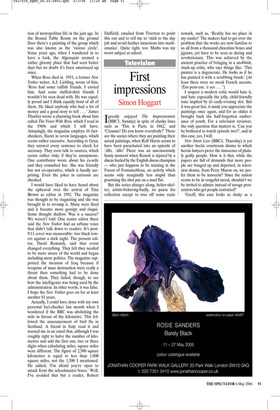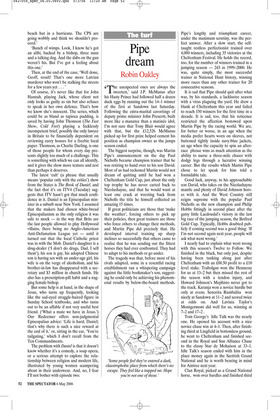First impressions
Simon Hoggart
Igreatly enjoyed The Impressionists (BBC1, Sunday) in spite of clunky lines such as ‘This is Paris, in 1862,’ and ‘Cézanne! Do you know everybody?’ There are the scenes where they are painting their actual paintings, when Rolf Harris seems to have been parachuted into an episode of ’Allo, ’Allo! There was an unconsciously funny moment when Renoir is injured by a discus hurled by the English discus champion — who just happens to be training in the Forest of Fontainebleau, an activity which seems only marginally less stupid than practising the shot put on a mud flat.
But the series charges along, helter-skelter, artists-behaving-badly, no pause for reflection except to toss off some runic remark, such as, ‘Reality has no place in my studio!’ The makers had to get over the problem that the works are now familiar to us all from a thousand chocolate boxes and jigsaws, yet have to be seen as daring and revolutionary. This was achieved by the ancient practice of bringing in a snobbish, stuck-up critic, who says things like: ‘This painter is a degenerate. He looks as if he has painted it with a scrubbing brush.’ (At least there were no mock French accents. ‘Ziss pent-eur, ’e ees ... ’) I suspect a modern critic would hate it, and hate especially the jolly, child-friendly tone implied by its early-evening slot. But it was great fun, it made you appreciate the paintings once again, and for us oldies it brought back the half-forgotten exuberance of youth. For a television reviewer, the only question that matters is, ‘Can you be bothered to watch episode two?’, and in this case, yes, I will.
New Street Law (BBC1, Thursday) is yet another hectic courtroom drama in which heroic lawyers prove the innocence of plainly guilty people. How is it that, while the papers are full of demands that more people are banged up and deported, in television drama, from Perry Mason on, we prefer them to be innocent? Since the nation seems to be in vengeful mood, shouldn’t we be invited to admire instead of savage prosecutors who get people convicted?
‘Geoff, this case looks as shaky as a beach hut in a hurricane. The CPS are going wobbly and think we shouldn’t proceed.’ ‘Bunch of wimps. Look, I know he’s got an alibi, backed by a bishop, three nuns and a talking dog. And the dabs on the gun weren’t his. But I’ve got a feeling about this one.’ Then, at the end of the case, ‘Well done, Geoff, result! That’s one more Latvian murderer who won’t be stalking the streets for a few years yet ... ’ Of course, it’s never like that for John Hannah, playing Jack, whose client not only looks as guilty as sin but also refuses to speak in her own defence. That’s how we know she’s innocent. The series, which could be as bland as tapioca pudding, is saved by having John Thomson (The Fast Show, Cold Feet) playing a fecklessly incompetent brief, possibly the only lawyer in Britain to be financially dependent on reviewing curry houses for a freebie local paper. Thomson, as Charlie Darling, is one of those people for whom every day presents slightly too much of a challenge. This is something with which we can all identify, and it gives the show more texture and zest than perhaps it deserves.
The latest ‘cult’ (a phrase that usually means ‘popular only with the critics’) show from the States is The Book of Daniel, and the fact that it’s on ITV4 (Tuesday) suggests that ITV hasn’t got that much confidence in it. Daniel is an Episcopalian minister in a suburb near New York. I assumed that the makers had chosen white-bread Episcopalianism as the only religion it was safe to mock — in the way that Brits are the last people allowed to play Hollywood villains, there being no Anglo–American Anti-Defamation League yet — until it turned out that the local Catholic priest was in with the Mob. Daniel’s daughter is a drug-dealer (‘I don’t do drugs, Dad, I sell them’), his son is gay, his adopted Chinese son is having sex with an under-age girl, his wife is on the verge of alcoholism, and his brother-in-law has disappeared with a secretary and $3 million in church funds. He also has a prescription-pill habit and a nagging female bishop.
But some help is at hand, in the shape of Jesus, who turns up frequently, looking like the sad-eyed straggle-haired figure in Sunday School textbooks, and who turns out to be an affable if not very useful best friend. (‘What a mate we have in Jesus.’) Our Redeemer offers non-judgmental Episcopalian advice: ‘Life is hard, Daniel; that’s why there is such a nice reward at the end of it,’ or, sitting in the car, ‘You’re tailgating,’ which I don’t recall from the Ten Commandments.
The problem with Daniel is that it doesn’t know whether it’s a comedy, a soap opera, or a serious attempt to explore the relationship between religion and modern life, illustrated by young women scampering about in their underwear. And, no, I fear I’ll not bother with episode two.















































 Previous page
Previous page